On the same day as Netanyahu celebrated a Pence lovefest in Jerusalem, Palestinian leader was told in Brussels that Washington remains an indispensable part of any peace process
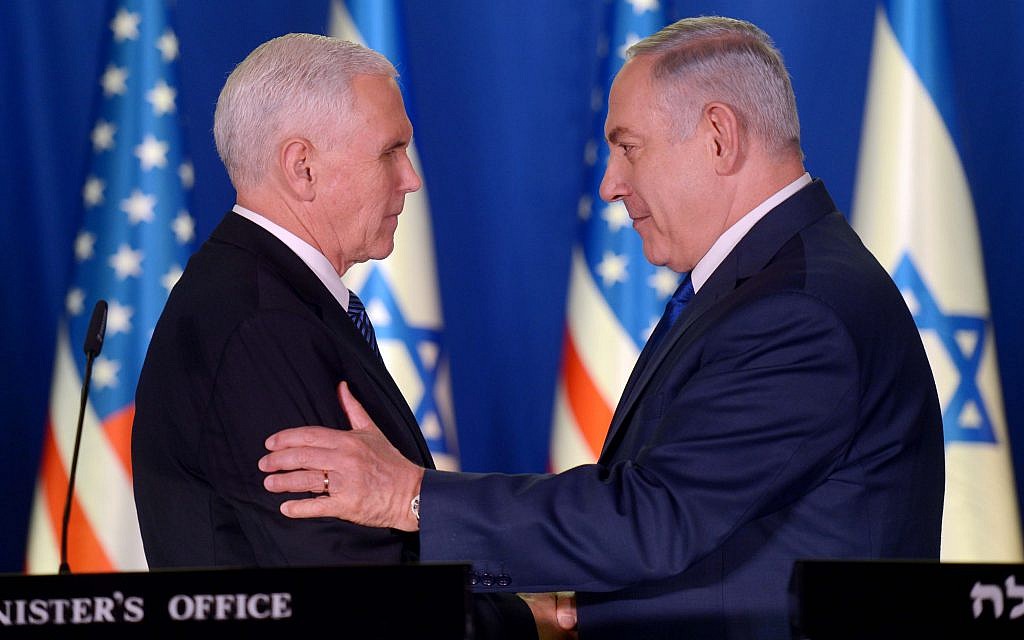
Monday was a significant day in the annals of the Israeli-Palestinian conflict. But rather than the conventional quarrels we have grown accustomed to, both violent and rhetoric, this day saw the two sides engage in what could be called a proxy diplomatic war.
Even though it currently appears distant, Israeli and Palestinian leaders know that sooner or later there will be another chapter in the peace process saga, and on Monday, they were battling over who would be in charge. The Israelis were working hard to secure a good starting position for when negotiations will resume, while the Palestinians were trying to organize a new sponsor of talks.
At the end of a long day, it appeared that Israel had won this round.
Due to the White House’s December 6 recognition of Jerusalem as Israel’s capital, the Palestinians no longer accept the US administration as honest brokers. Israel, however, remains adamant that the US is the only party that it can imagine presiding over peace talks, and is working hard to endear itself to the administration.
On Monday, Ramallah and Jerusalem sought to advance their positions with their respective patrons: Prime Minister Benjamin Netanyahu hosted US Vice President Mike Pence in Jerusalem, showering him with great honor and affection in a bid to cement Washington’s pro-Israel disposition. At the same time, Palestinian Authority President Mahmoud Abbas was in Brussels trying to woo the European Union, in the hope it would volunteer to replace Washington as the main sponsor of the peace process.
“The EU should play a political role in this Middle East peace process in order to reach a just solution on the basis of internationally recognized terms and decisions,” Abbas said, standing next to the union’s foreign policy chief, Federica Mogherini.
His comments came at about the same time as Pence, speaking from the Knesset podium, vowed to relocate the US embassy from Tel Aviv to Jerusalem before the end of 2019.
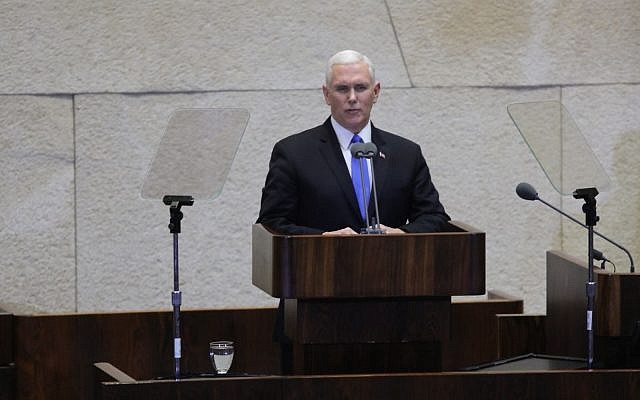
“Under President Trump, the United States of America remains fully committed to achieve a lasting peace between Israelis and Palestinians,” Pence said right after his embassy pledge.
The Palestinians were unimpressed, and continued to antagonize the Americans.
“The messianic discourse of Pence is a gift to extremists and has proven that the US administration is part of the problem rather than the solution,” senior Palestine Liberation Organization official Saeb Erekat said, in response to the vice presidential Knesset address.
Meanwhile in Brussels, Abbas tried to convince the EU to recognize Palestinian statehood, since such a move, he argued, would advance the cause of peace.
“We truly consider the European Union as a true partner and friend, and therefore we call its member states to swiftly recognize the state of Palestine,” Abbas said.
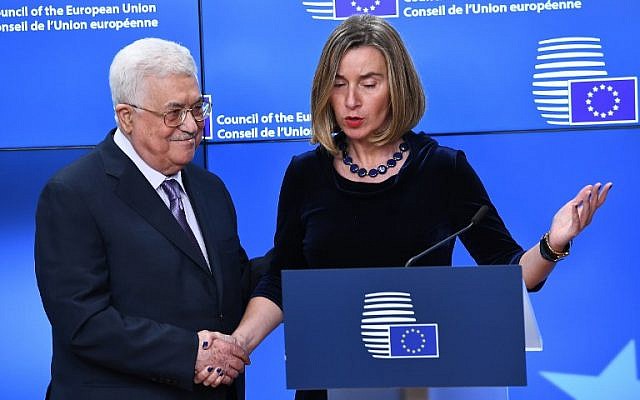
Indeed, on Sunday, it emerged that Slovenia is likely to recognize the “State of Palestine” in a few weeks, and that at least three other EU states are considering to follow suit.
However, Abbas’s hope for the EU to replace the US as main guardian of the Israeli-Palestinian peace process — something that, were it to happen, would constitute a dramatic change to the Palestinians’ benefit, as Brussels largely supports their positions — is much less likely to occur. (The EU envisions a Palestinian state on the 1967 lines, with East Jerusalem as its capital.)
For one thing, Netanyahu has made it abundantly clear, on numerous occasions, that Jerusalem will accept only the US as a peace broker — not Russia, not China and not the UN, and certainly not the EU, which he considers particularly hostile to Israel.
“There is no alternative for American leadership in the diplomatic process,” he told Israeli ambassadors Sunday. “Whoever is not ready to talk with the Americans about peace – does not want peace.”
The Europeans themselves are interested in playing a “central role” in a renewed peace process, Mogherini said Monday, but she also acknowledged that the US must remain an indispensable part of it.
What is needed, she maintained, is a “multilateral framework” that would include the Middle East Quartet — the EU, the US, the United Nations, and Russia — plus “a few Arab countries and possibly to Norway.”
“No effort will ever bring the two sides at the table if the international multilateral framework does not include the United States,” she declared. “The United States alone would not make it, the international community without the United States would not make it. We need to join forces.”
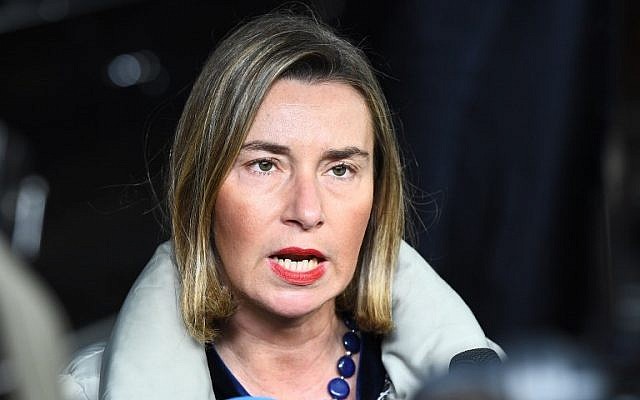
The Trump administration, struggling to advance its goal of clinching the “ultimate deal,” will be more than happy to get the support from European and Arab states. US officials have long argued that the international community has an important supporting role to play.
That is also why Trump’s peace envoy, Jason Greenblatt, is expected to attend a January 31 conference of major donors to the Palestinian Authority in Brussels.
Palestinian Authority Prime Minister Rami Hamdallah will also participate in the so-called extraordinary Ad-Hoc Liaison Committee meeting, which is set to become the first time senior PA and White House officials powwow since Trump’s Jerusalem move.
It will be interesting to see whether Ramallah uses this meeting as an opportunity to back down from its position and start again to engage constructively with Washington, or whether Abbas will continue to boycott the administration and look for other avenues to advance his statehood goal.
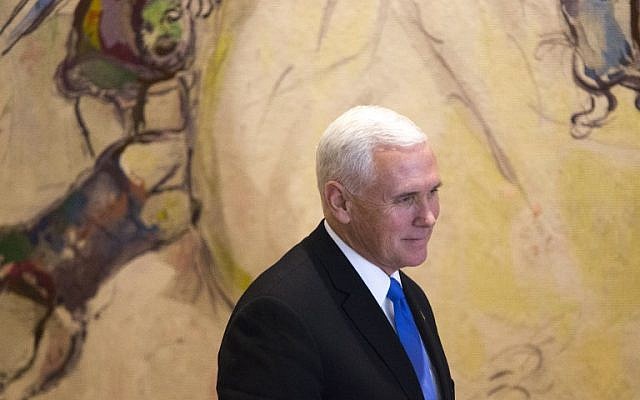
Though he was boycotted by the PA during this week’s trip to the region, one of Pence’s key messages here was that the administration still holds the door open for Abbas.
“We strongly urge the Palestinian leadership to return to the table,” he said at the Knesset. “Peace can only come through dialogue.”
The warm welcome the vice president received from Israelis, across nearly the entire political spectrum, further cemented the US-Israel alliance, putting Netanyahu in a good starting position if and when Washington unveils its peace proposal.
Abbas’s mission to recruit the Europeans as the new custodians of the peace process, however, appears to have largely failed.
As reported by The Times of Israel
